#LM letters
Text
les mis trending not during orestes fasting pylades drunk but during the sewer digression is sending me. rip vicky you would have loved this
337 notes
·
View notes
Text
LM 1.2.2: Baptistine and Magloire's fashions
madame Magloire avait l'air d'une paysanne et mademoiselle Baptistine d'une dame
Madame Magloire had the air of a peasant, and Mademoiselle Baptistine that of a lady
..I'm realizing that I get completely difference vibes off "dame" and "lady", but that's down to a century of linguistic drift and it's not Hugo or Hapgood's fault.
Dresses!!
Madame Magloire avait un bonnet blanc à tuyaux, au cou une jeannette d'or, le seul bijou de femme qu'il y eût dans la maison, un fichu très blanc sortant de la robe de bure noire à manches larges et courtes, un tablier de toile de coton à carreaux rouges et verts, noué à la ceinture d'un ruban vert, avec pièce d'estomac pareille rattachée par deux épingles aux deux coins d'en haut, aux pieds de gros souliers et des bas jaunes comme les femmes de Marseille.
Madame Magloire wore a white quilted cap, a gold Jeannette cross on a velvet ribbon upon her neck, the only bit of feminine jewelry that there was in the house, a very white fichu puffing out from a gown of coarse black woollen stuff, with large, short sleeves, an apron of cotton cloth in red and green checks, knotted round the waist with a green ribbon, with a stomacher of the same attached by two pins at the upper corners, coarse shoes on her feet, and yellow stockings, like the women of Marseilles.
I can picture this perfectly, and it sounds like a fun, colorful outfit . And comfortable!
And then there's Baptistine's outfit:
La robe de mademoiselle Baptistine était coupée sur les patrons de 1806, taille courte, fourreau étroit, manches à épaulettes, avec pattes et boutons. Elle cachait ses cheveux gris sous une perruque frisée dite à l'enfant.
Hapgood:
Mademoiselle Baptistine’s gown was cut on the patterns of 1806, with a short waist, a narrow, sheath-like skirt, puffed sleeves, with flaps and buttons. She concealed her gray hair under a frizzed wig known as the baby wig.
This is an interesting combo!
Her 1806 dress sounds like it was very fashionable for its day ( and though obviously that was 9 years ago, it wouldn't be too far from the fashionable silhouette in 1815)
Here's a lovely 1809 gown (arguably puce, even! ) from Victoria and Albert museum
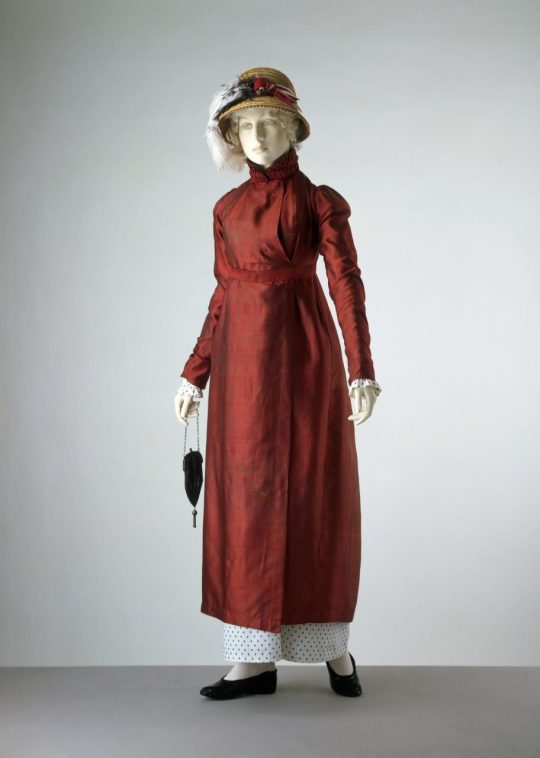
the hair, though?
The wig a l'enfant was a style made popular by Marie Antoinette; I'm not sure how many older women would still have been wearing it , but it's a distance away from the then-stylish neoclassical curls that would have been in style with an 1809 dress!
Here's a reenactment l'enfant wig, from Jennylafleur:

It would be quite a distinct combo, I think!
73 notes
·
View notes
Text


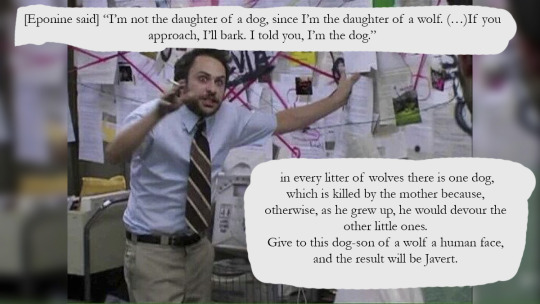

Feeling normal about Javert and Eponine today
#les mis#les mis letters#lm 5.1.19#im very normal about em#i was going to write an essay about them for today#but have this instead#javert-eponine parallels#javert/eponine parallels
4K notes
·
View notes
Text

Carlo Chiostri Valjean Teaches Cosette to Read
252 notes
·
View notes
Text
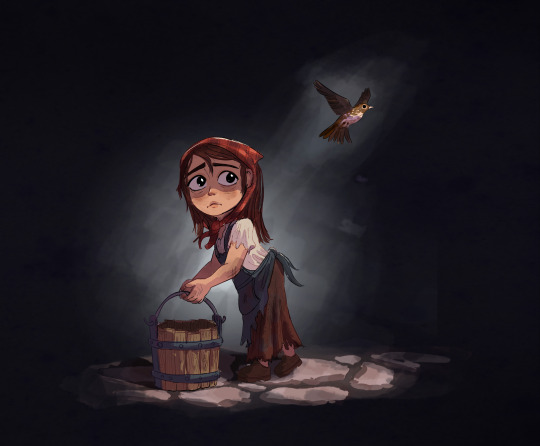

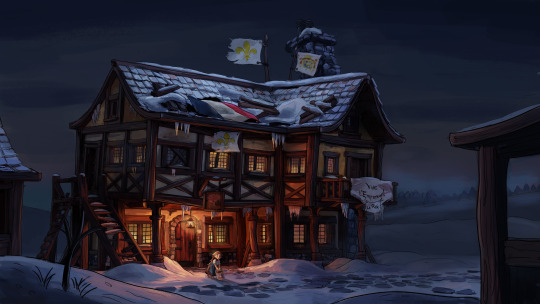


Cosette leaving the Sergeant of Waterloo inn :_; I'm planning to update my Cosette character designs soon.
200 notes
·
View notes
Text
if you're wondering what the big deal is about the louis-philippe sentence in les misérables, it is, in the original french, 760 words long. the subject of the sentence doesn't appear until 95% of the way through, at word #711; the main verb is word #712. the sentence contains 91 commas and 49 semicolons and is almost entirely a list of laudatory adjectival phrases describing the erstwhile king of france. this is perhaps especially notable because les mis is, shall we say, not known for being particularly gung-ho about the monarchy.
this sentence copied and pasted into Word takes up more than one page single-spaced. in the 1800-page folio classique edition, it is fully two and a half of those 1800 pages. that means that les mis is 0.14% this single sentence. more of les mis is made up of this sentence than earth's atmosphere is made up of carbon dioxide (0.04%). if the page count of les mis stayed the same but every sentence was the length of this one, les mis would consist of only 720 sentences total.
incidentally, guess who named hugo a peer of france 17 years before the publication of les mis?
#he also goes on for another six pages after this but by then he has remembered the existence of the full stop#the endnotes say that hugo 'se devait de faire [ce portrait] aussi favorable que possible à la personnalité de l'homme#qui avait favorisé sa carrière' (had to make this portrait as favorable as possible to the character of the man who had favored his career)#in fairness to hugo it's not like louis-philippe was alive to read this. so he wasn't just sucking up to get something out of it#he says at the end of the chapter that this description is 'entirely disinterested'. which like on the one hand i get#bc like i said louis-philippe was not in power and reading this. but otoh victor 'ancien pair de france' hugo u r not exactly unbiased. lol#les mis#lm 4.1.3#i just looked up the english translation and gasp! hapgood turned it into four separate sentences!!!!#so i think y'all who are reading it via les mis letters (which uses hapgood i think?) are gonna miss out on the full experience :/#my posts#linked to#syntax#idk if i got this across but the worst part is that the subject of the sentence - the beginning of the independent clause -#doesn't occur until the very end. so for the first 95% of the sentence you're just waiting for the bass to drop!!!#like reading it out loud you have to raise your pitch at the end of every dependent clause because you haven't gotten to the subject yet#AND THERE ARE SO MANY CLAUSES!! 49 SEMICOLONS PEOPLE!!! FORTY-NINE!!!!#victor hugo would be TERRIBLE as a hype man. he would take so long that the crowd would tear him to pieces with their fingernails#before louis-philippe could come out on stage. and then they'd be so mad at louis-philippe for inspiring him that they'd tear LP apart too#actually i think i'm using hype man wrong. i'm thinking of the guy that gets the crowd hyped up for the main guy before the main guy#makes an appearance. a hype man is the guy who makes interjections during a song. victor hugo would be bad at both of these#like just imagine the announcer at the beginning of a basketball game. and now...your starting lineup...at power forward...#and then he just says the 760-word louis-philippe sentence.#dead. murdered at the hands of the fans. microphone shoved down his trachea.
2K notes
·
View notes
Text
A fun pun from yesterday's Les Mis chapter:
Gavroche says: “And make haste, Monsieur What’s-your-name, for Mamselle Cosette is waiting.”
This line in French is: “Et dépêchez-vous, monsieur Chose, puisque mamselle Chosette attend.”
"Chose" means "thing" so Gavroche is kind of calling Jean Valjean "monsieur thingamajig" since he doesn't know Valjean's name. The funny part is that this can be made into a pun when he refers to Cosette as "Chosette" instead, which is just the word "chose" with a feminine "ette" tacked on, making them Monsieur Chose and Mamselle Chosette.
Rose attempts the translation of this pun more than Hapgood does, but neither express how well this works because of Cosette's name.
405 notes
·
View notes
Text
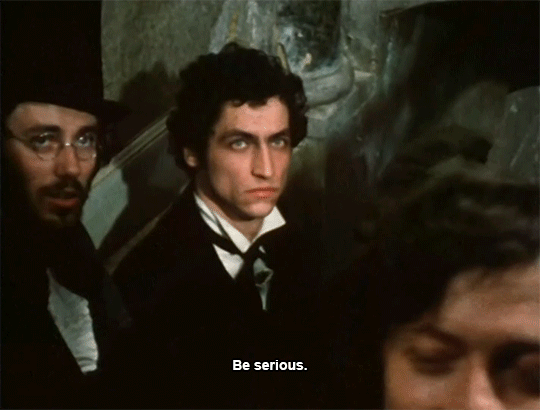


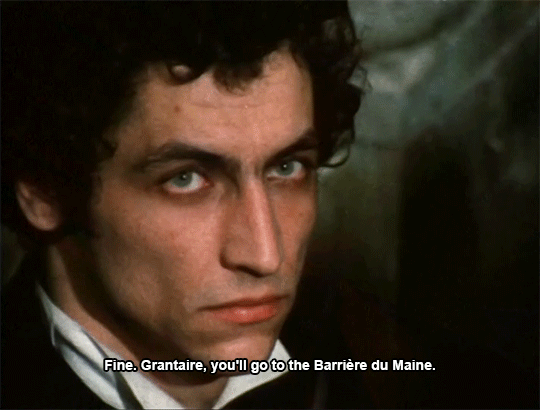
LES MIS LETTERS IN ADAPTATION - Enjolras and his Lieutenants, LM 4.1.6 (Les Miserables 1972)
“Be serious,” said Enjolras.
“I am wild,” replied Grantaire.
Enjolras meditated for a few moments, and made the gesture of a man who has taken a resolution.
“Grantaire,” he said gravely, “I consent to try you. You shall go to the Barrière du Maine.”
Grantaire lived in furnished lodgings very near the Café Musain. He went out, and five minutes later he returned. He had gone home to put on a Robespierre waistcoat.
“Red,” said he as he entered, and he looked intently at Enjolras. Then, with the palm of his energetic hand, he laid the two scarlet points of the waistcoat across his breast.
#Les Mis#Les Mis Letters#Les Miserables#Les Mis Letters in Adaptation#Les Mis 1972#Les Miserables 1972#Enjoltaire#Grantaire#Enjolras#lesmisedit#lesmiserablesedit#pureanonedits#LM 4.1.6#I kinda love this Grantaire!!!#lesmiserables1972edit
502 notes
·
View notes
Text
“On disarranging Marius’ garments, he had found two things in his pockets, the roll which had been forgotten there on the preceding evening, and Marius’ pocketbook. He ate the roll and opened the pocketbook.”
I can’t believe Javert was right, Valjean will always be a bread thief
305 notes
·
View notes
Text

in which JVJ, who has never once opened up to another human being, a single time, ever.... talks about the scary nun for the rest of his life (?)
121 notes
·
View notes
Text

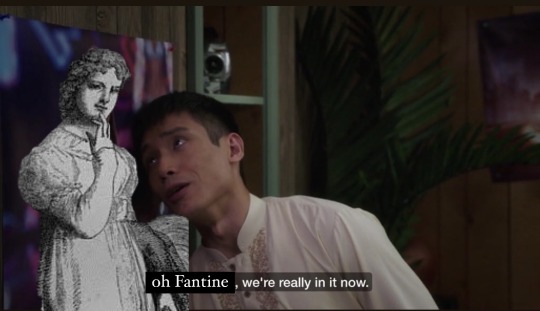
#i have many talking points to post re: todays chapter but let's start with this#come back later for sex work informed analysis of how this chapter is presented if u want#les mis#lm letters#les mis letters#fantine analysis tag#les miserables#fantine#lm 1.5.10#mine
126 notes
·
View notes
Text

Real fans know what's up !!
327 notes
·
View notes
Text
One super funny thing about the French Rev (that Victor Hugo even references in Les Mis) is the way it altered naming conventions, resulting in tons of WILD amazing ridiculous names!
Basically what happened was— during the French Rev the laws around registering names were relaxed, so people started giving extremely revolutionary names to themselves and their babies.
Sadly Napoleon’s government later cracked down on this. When Napoleon came into power he passed a restrictive law mandating that people had to choose among a list of “normal” names, banning the weird revolution ones, because he was a spineless coward afraid of the power these names had. The restrictive naming laws weren’t repealed until late in the 20th century.
But anyway here are some of my favorite French Rev baby names (taken from this list):
Mort Aux Aristocrates -“Death to Aristocrats”
Amour Sacré de la Patrie l’an Trois -“Sacred Love of the Fatherland Year III”
Lagrenade —“The Grenade”
Droit de l’Homme Tricolor “Right of Man Tricolor”
Égalité — “Equality”
Régénérée Vigueur— “Regenerated Strength”
Marat, ami du peuple -“Marat, friend of the people”
Marat, défenseur de la Patrie—“Marat, defender of the Fatherland”
La Loi-“The Law”
Philippe Thomas Ve de bon coeur pour la République — “Philippe Thomas ‘Go with a good heart for the Republic’”
Raison —“Reason”
Simon Liberté ou la Mort —“Simon “Freedom or Death””
Citoyen Français—“French Citizen”
Sans Crainte— “Without Fear”
Unitée Impérissable— “Imperishable Unity”
Victoire Fédérative— “Federal Victory”
Vengeur Constant —“Constant Avenger”
#les mis#les mis letters#French Revolution#lm 1.4.3#here is my son Death to Aristocrats#and his sister The Grenade
5K notes
·
View notes
Text

m. bienvenue my beloved
#les mis letters#the next dozen entries are a continuation in this vein and i for one cannot wait#les miz#the brick#les misérables#les mis#lm 1.1.2
1K notes
·
View notes
Text

Jean Valjean, inspired by this line from his introduction chapter:
It was, moreover, a firm, energetic, and melancholy profile. This physiognomy was strangely composed; it began by seeming humble, and ended by seeming severe. The eye shone beneath its lashes like a fire beneath brushwood.
(I'm working on a series of stained glass paintings for Jean Valjean's different names/titles/identities; here's a link to the previous painting in the series)
#les mis#lm 1.2.1#jean valjean#les mis letters#stained glass#les mis art#my les mis art#stained glass valjean series#ideologically i dont agree with catholicism but they kinda went off with the aesthetic
257 notes
·
View notes
Text
So I started rereading les mis, in french this time, and I'm sort of catching up to les mis letters (only sort of, for now, since I'm still at chapter 1.2.5 I think) and I do wanna talk about the title of the book because that title has fascinated me ever since I opened that book 14 years ago in its greek translation. So the greek translation of the title "les Misérables" mystified me. I think a big part of western languages have a variation of the word "misérable" in their vocabulary so the translation of the title is pretty much consistent (obviously not every western language, idk what happens with scandinavian translations or hungarian or russian for example). In greek we do not have the word "miserable" or "misery", we kind of use the word "mizeria" but only as a "western" variation of the greek word we have for misery, so we don't have the equivalent adjective. So the original greek translator needed to find a brand new adjective, in greek, to convey the meaning of the title, and honestly, what a task that is, finding the greek equivalent of probably the most iconic title in literature ever, just one word to encapsulate 1500 pages of text.
The word finally used is "Άθλιοι" (Athlioi) the plural form of "Athlios". It's an ancient greek word that is also commonly used in modern greek as is the case for a huge part of our vocabulary. So the ancient greek definition of "Athlioi" is "struggling, unhappy, wretched, miserable". In modern greek, the definition is more or less the same: "seedy, miserable, poor, terrible", except for the last word "terrible" that has an interesting connotation. The definition of "Athlioi" as terrible is an addition of modern greek. "Terrible" by itself maybe doesn't say much and it seems as a mere variation of the classic definition of Athlioi as "miserable, poor, wretched" etc. But from miserable and wretched to terrible there is an interesting leap. While "seedy, miserable, poor, terrible" are the english translations of the greek word "Athlioi" that I find on wordreference.com, I get very interesting results when I inverse the search, this time searching for the greek translation of the following english words (on wordreference or glosbe): despicable, nasty, vile, shady, appaling, loathsome, wicked, infamous, monstrous, horrible, lame, shabby, mangy, mean, vicious. You may have guessed it, all of the above are translated into "Athlios" in greek (among other words). The reason for that is that "Athlios" in modern greek has an extremely negative connotation. An "athlios" is not just a miserable wretched poor outcast. An "athlios" is a despicable human being, one that inspires disgust, one you should avoid in any case. A horrendous, vile, monstrous, hateful, creature. I am not sure if the word "Athlios" already had that definition at the time of the first greek translation (end of 19th century) but my bet is that it did, because that is what the word is primarily used for in Greece ever since I remember myself. When we use the word "Athlios" in greek now we rarely if ever talk about someone "miserable", "poor" or "wretched". We normally talk about someone or something despicable. If it's a person, 99% of the time this has a purely moral connotation aka, someone who is morally despicable. They could be a poor person, (a Thenardier type of vile individual) or they could be rich, doesn't matter really.
I am not sure if the word "misérable" or the english word "miserable" have this connotation. It is one thing to be wretched and totally another thing to be despicable and loathsome. Is this very close to the french word "misérable"? "Misérable" in french primarily means "pitiful, wretched", with one mention of "despicable", it is true. In Larousse however (the classic french dictionary) I cannot find one definition of "misérable" with the "vile, despicable" connotation that the word "Athlios" has. I am sure "misérable" can be used that way, and it can be translated that way in english, but vile and despicable are not the leading definition one thinks about when they encounter the word. When we use the word "misérable"/miserable, we normally do not immediately think of a despicable, vile, loathsome individual. So this choice of title by the greek translator takes some liberties. He could have used our greek word for "pitiful", "outcast" or one particular greek word we have for "scorned" that has a particular depth because it means scorned, neglected and forgotten by society all at the same time. Or he could have went for our word for "miserable" in the sense of "unhappy". All of these could have worked well enough. But he went for "Athlioi". Why? Athlioi is the only word that has a truly negative connotation for the morality of a person, of their moral value, and the way society percieves that moral value.
I got to the chapter "The Evening of a Day of Walking" where Valjean makes his first appearence. The english translation is this:
"It was difficult to encounter a wayfarer of more wretched appearance".
Then Hugo proceeds with a description of his appearance that is particularly unsettling, to say the least. He was literally dressed in rags with iron-shod shoes and he had holes in his clothes. At the end of the description he says:
"The sweat, the heat, the journey on foot, the dust, added I know not what sordid quality to this dilapidated whole".
So that guy is 1) certainly unhappy, 2) clearly wretched, 3) has a sordid quality and 4) a dilapidated look.
It is interesting that in french, the phrase "wretched appearance" is actually "aspect misérable". It is important to note this because this is the first time that the author gives us a description of a character that encapsulates what a "Misérable" according to the title actually is. Moving along, Valjean is not accepted in any inn or house and the people force him to leave because they are horrified by 1) his appearance and mainly 2) his profile as an ex convict that makes him a "Dangerous Man". "Dangerous Man" is literally written on his passport. A pitiful creature is maybe not that loathsome by itself, but a "Dangerous Man" is definitely something that you want to stay away from.
At the chapter "The Heroism of Passive Obedience" (1.2.3) Valjean enters the bishop's house and the bishop's sister sees him and describes him like this:
"He was hideous. It was a sinister apparition."
"Mademoiselle Baptistine turned round, beheld the man entering, and half started up in terror".
"Wretched" and "pitiful" cannot cover the impact this individual had on people, on society. That man was not just deeply unhappy, in a deplorable state, wretched and pitiful. That man was appaling. That man was loathsome. That man inspired horror, disgust, and intense, bone deep hatred. It is important to note this aspect of "misérable". The fear society has for the injustice it creates is so strong that it is far easier to dehumanize these individuals by slapping the label of "despicable", "vile", "loathsome" on them. It makes their total marginalisation easier because it justifies it. People are truly disgusted by and terrorised by Valjean. For society, there is a reason why that man is in a pathetic, deplorable, "miserable" state. It's because he is truly, irrevocably, morally hideous, loathsome and nasty. He is "dangerous". He truly is a monster inside out. And that particular manifestation of social misery is nicely conveyed by the word "Athlios" in my opinion.
#les miserables#aspa reads les mis#jean valjean#les mis letters#catching up#les mis translations#lm 1.2.3#lm 1.2.1#les misérables#aspa rambles#long post#the brick
111 notes
·
View notes